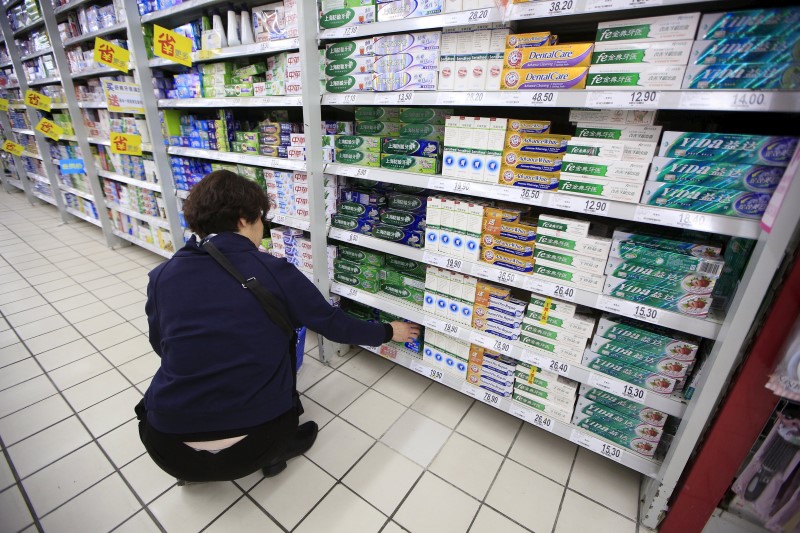By Adam Jourdan and Donny Kwok
SHANGHAI/HONG KONG (Reuters) - Retailers in China are shedding staff, slowing expansion plans and seeing stocks pile up in warehouses as shoppers tighten their belts - a major headache for a country that has pinned its hopes on consumers to drive economic growth.
With that growth running at its slowest in a quarter of a century, China's consumption patterns are changing, with wealthy middle-class households trading down from up-market to more affordable brands, and poorer families paring back on even basic purchases.
China's top 50 retailers saw sales fall 6 percent at the start of the year, and sales of basic goods from noodles to detergent grew just 1.8 percent at the end of last year, down from over 9 percent just three years ago, according to Kantar Worldpanel data.
The weak sales of even cheap household goods underlines the challenge for China, desperate to get its 1.4 billion people to spend and give some fresh impetus to the economy.
"Maybe before, if I wanted something I'd just go and buy it. Now I only buy things I really need," said Yang Shunjie, 28, a Shanghai-based client manager at a state-owned firm, who earns between 10,000-15,000 yuan ($1,500-$2,300) a month. He said he also shops more online where prices are cheaper and will wait for end-of-season discounts to buy new clothes.
This is a problem for sectors from retail to luxury and even fast-food, where many international names have banked on continued growth.
Procter & Gamble (N:PG), whose China products include Pampers diapers and Tide laundry detergent, said in January its sales were "significantly down" compared with 2014. Infant formula maker Mead Johnson Nutrition Co (N:MJN) said price competition and a shift to smaller shops and online hit sales.
"We are seeing shifts within retail. High-end luxury goods have had a very good few years, but that's coming to an end. Tastes are changing," said Mark Williams, chief Asia economist at Capital Economics in London.
Westpac's most recent consumer survey showed sentiment at its lowest since October. "The February update points to continued weak conditions and elevated job-loss fears again weighing on the consumer mood," said Senior Economist Matthew Hassan, adding that any loss of momentum for consumer demand could raise the risk that growth stays weaker for longer.
"CARNAGE"
Some firms are bucking the downturn.
International brands offering "affordable luxury" such as coffee chain Starbucks Corp (O:SBUX) and high-end sporting goods giants Nike Inc (N:NKE) and adidas AG (DE:ADSGn) have still grown. Adidas says it has not seen an impact on its business and plans to open some 3,000 new stores in China by end-2020.
But retail executives and consumer goods makers said China's slow growth is punishing the sector and forcing many to cut back, focus on smaller, faster-growing cities and offer more discounts.
"We are struggling to adapt as sales move online or to small mom-and-pop stores," said a senior sales executive at a major Western consumer goods firm. "At the moment, it's carnage."
He said inventory levels at some clients had jumped to as much as nine months, from a normal average of around two weeks.
For retailers and consumer goods brands alike, that means re-thinking their sales pitch. China-based advertising executives say some are adopting a two-tier marketing strategy: imported, premium ranges to target more affluent consumers, but also buying up popular and affordable local brands.
Reckitt Benckiser Group's CEO (L:RB) said last month its Chinese sore throat remedy Manyanshuning was a "local hero".
WARNING SIGNS
Already this year, weak consumer demand has triggered a spike in profit warnings from China-focused consumer firms.
Food group Tingyi (HK:0322), grocery chain Lianhua Supermarket <0980.HK>, China Outfitters <1146.HK> and Man Sang Jewellery (HK:1466) are among those blaming poor sales on "weakening consumption" and an expectation of lower prices.
"This year hasn't been great, in fact up until now business has been slow," said Chen Lu, a sales assistant at household goods chain Enjoy Easy in Shanghai. Chen added shoppers who spent 100-200 yuan ($15-$30) per visit last year on products from clothes hangers to sponges were spending a lot less. "Now each person might spend just a few dollars."
Sun Art, China's second-biggest hypermarket operator, said last month that 2016 would be a "challenging year" for retailers. Its 2015 profits declined 16 percent.
The weakness has spread to Hong Kong, which often relies heavily on mainland visitors to drive demand. Retail sales there had their biggest fall in 13 years in 2015, and the slump has continued this year.
"Most of our members saw double digit falls in sales (in February)," Thomson Cheng, chairman of the Hong Kong Retail Management Association, said on a conference call this month, adding many retailers were cutting staff to stay afloat.

"We are all very worried about the situation."